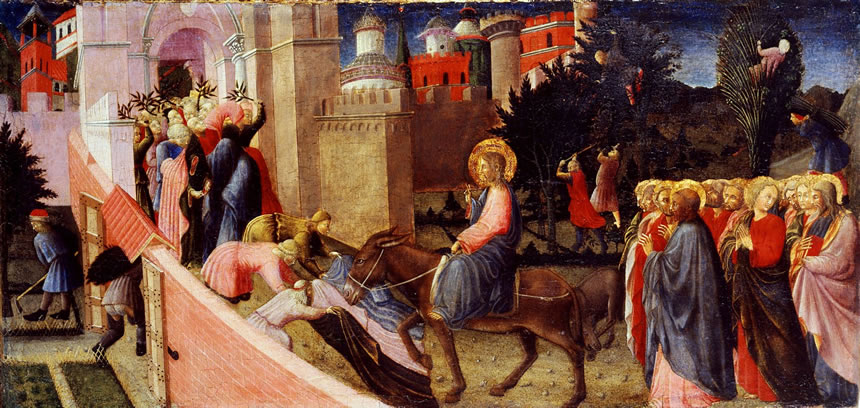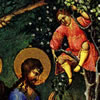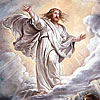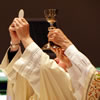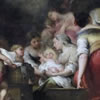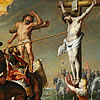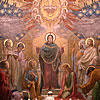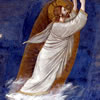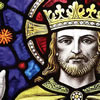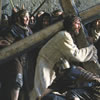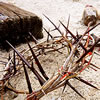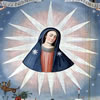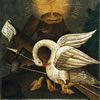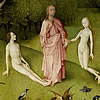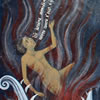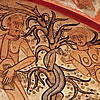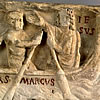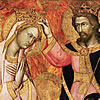Hosanna in the Highest
Growing up Catholic, I sometimes never really paid much attention to the words that we say during mass. It could be because we are taught to dwell on the meaning of the mass as a whole. But sometimes it would be nice to know why we do and say things during mass. We have to remember there must have been some reason why we do and say things. The one phrase I was curious about was the, “Hosanna.”
As we move from the Liturgy of the Word to the Liturgy of the Eucharist, during the mass, the priest prepares for the Eucharistic Prayer. He asks, in behalf of us, that the bread and wine – which will become the body and blood of Christ – be acceptable as a sacrificial offering. The words were crafted exactly to embody this idea:
The priest stands and says:
Pray, brethren (brothers and sisters),
that my sacrifice and yours
may be acceptable to God,
the almighty Father.
The people rise and reply:
May the Lord accept the sacrifice at your hands
for the praise and glory of his name,
for our good and the good of all his holy Church.
The priest then starts the Eucharistic Prayer and just before the consecration, the people say:
Holy, Holy, Holy Lord God of hosts.
Heaven and earth are full of your glory.
Hosanna in the highest.
Blessed is he who comes in the name of the Lord.
Hosanna in the highest.
What is “hosanna?” Where have we heard this before? If we remember Jesus’ entry into Jerusalem, riding on a donkey, the people chanted this exact phrase as Mark recounts to us:
Many people spread their cloaks on the road, and others spread leafy branches that they had cut from the fields. Those preceding him as well as those following kept crying out:
Hosanna!
Blessed is he who comes in the name of the Lord!
Blessed is the kingdom of our father David that is to come!
Hosanna in the highest!
Mark 11:9-10
I don’t know if you are thinking as I am, but this has got to be one of the oddest things to do: spread their cloaks on the road, spread leafy branches, then cry out “Hosanna.” We’ve never seen this kind of reaction to anyone before. There is no historic precedent, but there is a scene similar to it and it is in the Old Testament. Let us read it in Psalm 118:
Hosanna!
LORD, grant good fortune!
Blessed is he who comes in the name of the LORD.
We bless you from the house of the LORD.
The LORD is God and has enlightened us.
Join in procession with leafy branches up to the horns of the altar.
Psalm 118: 25 – 27
The word “Hosanna” is translated into English as “LORD, grant salvation!” So in these verses we see a people who are happy about someone whom God has sent. When they say, “Hosanna, (LORD, grant salvation),” they are referring to the messiah who they believe is to come from God and grant them salvation. They are so happy that they form a procession with leafy branches as they proceed to the altar.
Isn’t this the exact scene the people in Jerusalem are trying to act out – complete with the leafy branches? Would it be even more fascinating to know that when Jesus entered Jerusalem he went straight to the temple? ("He entered Jerusalem and went into the temple area. He looked around at everything and, since it was already late, went out to Bethany with the Twelve.” Mark 11:11) Isn’t the temple where the altar is? So indeed the Psalm has foretold this scene; and the people in Jerusalem are enacting this scene because they must have known this by heart from scripture.
During those days the messiah was thought of a great warrior – a Davidic King – that would free them from the Romans. They were looking for a king, and a king they found. What must have tipped them off that Jesus was this king?
Prior to His entry into Jerusalem, Jesus did another peculiar thing: he asked some disciples to get him a donkey:
When they drew near to Jerusalem, to Bethphage and Bethany at the Mount of Olives, he sent two of his disciples and said to them, “Go into the village opposite you, and immediately on entering it, you will find a colt tethered on which no one has ever sat. Untie it and bring it here.
Mark 11: 1-2
It seems like a command without a purpose, but we know everything that his apostles recorded must have had some purpose. We might miss this purpose if we don’t realize that only kings (of their time) had the right to procure some mode of transportation. In fact it is the right of a king to demand for an animal that no one has ever sat on. I am sure when the people of Jerusalem heard about this, they would have thought, “king” without hesitation. In fact the spreading of cloaks on the road was a gesture reserved only for a king.
They did find a king but not the king they had in mind because Jesus did not come to fight, but came to be sacrificed. So we have a king and we have a sacrifice, but how does this tie up with the, “hosanna” in our mass? There are two reasons.
The first is we believe that the bread and wine that the priest has prepared will become the body and blood of Christ. So we are re-enacting that entry into Jerusalem. They were waiting for their king to appear and go to the altar. So we say the same words before the consecration because we are waiting for Our King, Christ, who will“go" to altar in the appearance of bread and wine.
The second is we believe Jesus was sent by the Father to save us, so we affirm that when we say, “Hosanna, (LORD, grant us salvation.) Blessed is He who comes in the name of the LORD.”
Next time we go to mass, let us wait for this particular part and concentrate on its meaning. It may jolt us into the realization that Jesus is about to come into our presence and so we may look at The Host with more love when the priest raises it up for all to see and adore.

A Sky Full of Stars
Know Our Lady through her Titles in the Litany
The Church helps us understand who Mary is by honoring her with different titles in the Litany of the Blessed Virgin Mary. Unfortunately, over time and difference of culture, we might not grasp what it is the Church is ascribing to her and lose that opportinity to get to know her.
In A Sky Full of Stars, each title of the Litany is explained so we get know Mary more and fall in love with her all over again.
Get your copy now either in Hardbound, Paperback, or Kindle
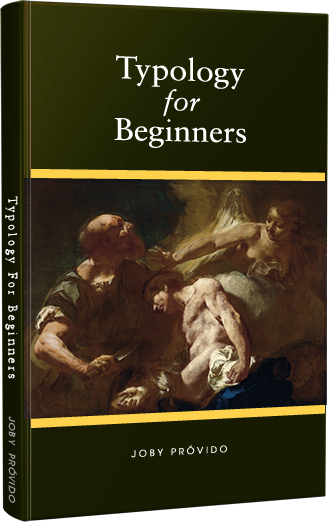
Typology for Beginners
A Catholic Perspective on understanding the New Testament through the Old Testament
First-century Jews converted to Christianity in droves because of the way the New Testament was written to show Jesus was the Messiah promised by the Old Testament. We also learn about how Mary is the New Eve and the Ark of the Covenant in the way the writers portray her.
Through typology, the patterns that connect the Old and New Testaments make the Bible stories more accessible so that one becomes excited to read Sacred Scripture again.
Get your copy now either in Hardbound, Paperback, or Kindle
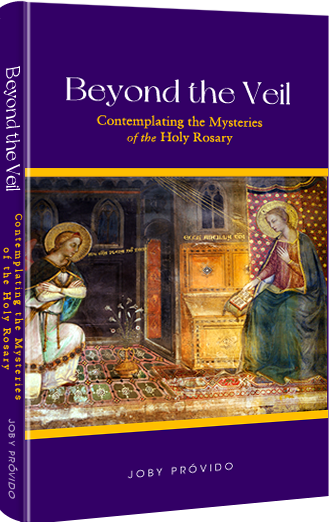
Beyond the Veil
Contemplating the Mysteries of the Holy Rosary
Prayer giants like Pope St. John Paul II, Pope Paul VI, Bl. Archbishop Fulton Sheen, and Bishop Robert Baron advocate that we contemplate on the mysteries of the rosary while we say the vocal prayers. Unfortunately, there are not many books that teach us how to do this. Beyond the Veil comes to the rescue by suggesting seven ways we can pray the rosary the way it was intended.
The larger part of the book offers mental images for each of the mysteries we can use in our contemplation, for how can we imagine the scenes in the rosary if we don't know about them?
Get your copy now either in Hardbound, Paperback, or Kindle
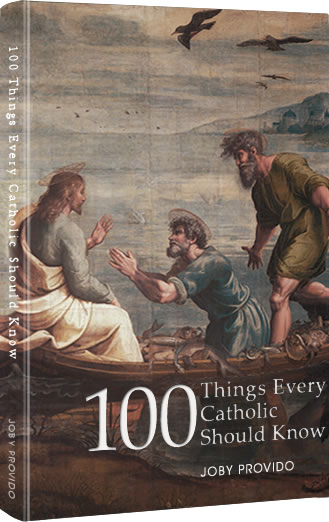
100 Things Every Catholic Should Know
Whether or not you are new to the Catholic Church, or struggling, or lapsed, or dynamically involved, this book will enlighten you with the essentials of the Faith that have been handed down to us by the apostles.
Each of the 100 topics is easy to read and distilled into bite-sized portions. Through cross-referencing, the book also shows how the topics are interrelated. Those who are new to the Faith will find this book an edifying handy reference, and those who have simply forgotten will find it a great review material that might spark a new love for God and religion.
Get your copy now either in Hardbound, Paperback, or Kindle


